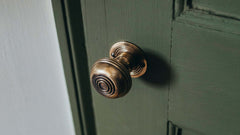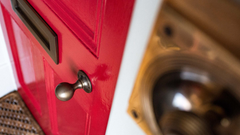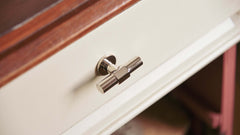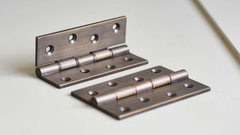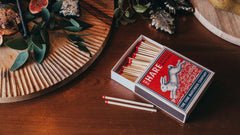We sell a range of door knockers at Willow & Stone from traditional period designs to modern and stylish classics. Here we take a brief look at the history of the door knocker and share some of our favourite antique originals.
THE EARLY DOOR KNOCKER
Door knockers have a bit of a dark past, with the earliest thought to originate from Ancient Greece where slaves were chained to a heavy ring attached to the door in order to welcome any guests. In the event the slave had fallen asleep, the guest would tap the knocker to raise the attention of the home owner. The Romans continued with the use of the knocker and it spread across the empire, and so the heavy knocker remained as a means for visitors to announce their presence until around the 15th century.
THE USE OF DOOR KNOCKERS IN ENGLAND
As early as the 16th century door knockers adorned peoples homes and although most were fairly plain as blacksmiths developed their skills, wealthy people began to have more detailed designs, often relating to local patterns and traditions.

One of the first UK foundries was Kenricks in West Bromwich. Founded in the 1760s, the family firm exported everyday cast iron goods worldwide. They also produced a range of ornate items for the home and garden reflecting the fashions of the time, including front door furniture.
At the beginning of the Georgian period door knockers were generally still simple, cast iron and painted black, but as they became more widely used in the 1800s it became fashionable to have more elaborate door knockers such as Lion Heads and Sphynx’s and were often cast in brass or bronze.
The later part of the Georgian era saw brass become the main material for door furniture. It also was the time when bell pulls came into use (1830’s) and when the penny post began (1840s), starting the need for letter boxes.
Above shows our
Brass Doctors Door Knocker which is based on an early Georgian design and was named the ‘Doctors Door Knocker’ as it was used to identify the front door of a doctor’s house. Throughout the Victorian Period the door knocker remained, often as a show of wealth in increasingly elaborate designs and highly polished brass.
LION'S HEAD DOOR KNOCKERS
As the door knocker became more elaborate over time, many designs were inspired by mythology and religion. The Lion's head door knocker with it’s mouth gripping the ring became particularly popular in the early 19th Century and has remained a favourite today. The lion has been used as symbol of Great Britain and is thought to signify strength, pride, protection and power. A Lion's head door knocker acts a guardian to the home.

HAND SHAPED DOOR KNOCKERS
Another beautiful door knocker spotted the world over is the hand shaped door knocker. Considered to have originated in Muslim countries and symbolise the Hand of Fatima, it would indicate that a person of Muslim faith lived in the house and was used as a sign of protection.
It is also suggested that two types of hand door knocker exist, a male and a female, both of which would be present on the front door each with it’s own distinct sound. The visitor would then knock the appropriate knocker according to their gender and the woman of the house would know whether or not she should open the door.
FISH SHAPED DOOR KNOCKERS
Being located in Falmouth we can’t resist the charm of fish shaped door knockers. Thought to originate from Scottish foundries, knockers with a maritime theme were often seen on the homes of shipping merchants.
There are a wide variety of dolphin and mythical fish shaped knockers, each with their own meaning - for example a carp is a symbol of good luck and abundance and a fish with a Poseidon fork design depicts power and a mastery of the seas.
We now offer 2 unique hand made fish door knockers, a Salmon and Carp as pictured below:
So in choosing your door knocker, bear in mind their interesting meanings and historical references and most of all, have fun with it!
Browse our range of door knockers and front door furniture
here, or feel free to get in touch to discuss your project and we’ll be more than happy to help.
You can call us on 01326 311 388 or email sales@willowandstone.co.uk






